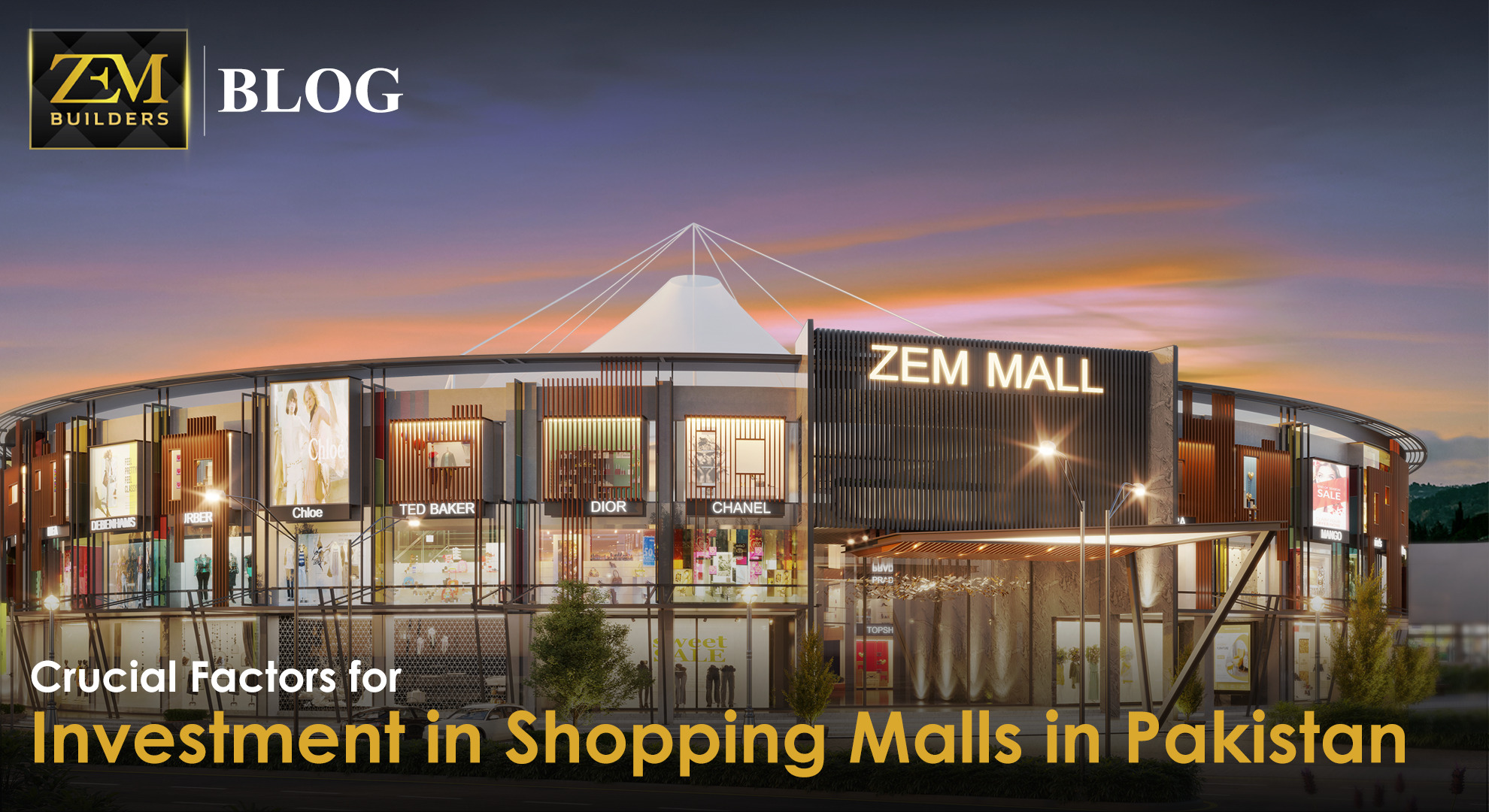Important Factors for Investment in Shopping Malls in Pakistan 2023

Are you contemplating an investment in shopping malls in Pakistan? This dynamic sector offers great potential, but making the right investment decisions requires careful consideration of various factors. In this guide, we will explore the crucial factors you need to evaluate before investing in shopping malls in Pakistan. From market trends to location and sustainability, we’ll cover everything you need to know to make an informed decision.
Understanding the Retail Landscape for Investing in shopping malls in Pakistan
Investing in shopping malls requires a solid understanding of the local retail landscape. Consider the current state of the retail market, consumer preferences, and the competitive landscape. Analyzing these factors will help you identify opportunities and challenges, ensuring your investment alignments with market trends.
Location
The old saying holds true for shopping mall investments. The location of your mall plays a pivotal role in its success. Decide on the areas with high foot traffic, accessibility, and potential for growth. Proximity to residential areas, offices, and transportation hubs can significantly boost your mall’s viability.

Infrastructure and Amenities
Modern shopping malls are more than just retail spaces; they’re lifestyle destinations. Look for malls that offer state-of-the-art infrastructure, ample parking, and a variety of amenities such as food courts, entertainment options, and leisure areas. These features enhance the shopping experience and attract a diverse crowd.
Tenant Mix and Diversity
The success of a shopping mall hinges on its tenant mix. A diverse range of retailers attracts a broader customer base and creates a vibrant atmosphere. Prioritize a mix of anchor stores, specialty shops, and well-known brands to cater to different preferences.

Market Demand and Gap Analysis
Conduct a thorough market demand analysis to identify gaps in the retail landscape. This analysis will guide your tenant selection process, ensuring you offer products and services that are in high demand and not readily available in the vicinity.
Sustainability and Green Initiatives
With growing environmental consciousness, sustainable practices are becoming increasingly important. Investing in a mall that incorporates green initiatives not only contributes to the environment but also attracts eco-conscious customers.
Legal and Regulatory Factors
Navigating legal and regulatory frameworks is essential. Ensure the shopping mall complies with zoning regulations, permits, and licensing requirements. A clear legal structure safeguards your investment and prevents potential legal hurdles.

Projected Return on Investment (ROI)
Evaluate the potential ROI of your investment. Consider factors such as rental income, operational costs, and expected appreciation in property value. A thorough financial analysis will help you determine the feasibility of your investment.
Risk Assessment
Every investment carries inherent risks. Assess potential risks such as economic fluctuations, changes in consumer behavior, and competition. Developing contingency plans for various scenarios will help you mitigate these risks effectively.
Financing and Funding Options
Before diving into an investment, explore financing and funding options. Whether through personal funds, bank loans, or partnerships, understanding your financial avenues will impact your investment strategy.
Market Trends and Future Projections
Stay updated on market trends and future projections. The retail sector is constantly evolving, and being ahead of the curve allows you to adapt your strategies and offerings to meet changing consumer demands.
Due Diligence and Professional Assistance
Conduct thorough due diligence before finalizing an investment. Enlist the help of professionals, such as real estate agents, legal experts, and financial advisors, to ensure you make informed decisions.

FAQs
Q: What makes the location of a shopping mall so important?
A: The location determines the mall’s accessibility, visibility, and potential customer base. A well-chosen location can significantly impact foot traffic and business success.
Q: How can I ensure a diverse tenant mix in my shopping mall?
A: Prioritize tenant diversity by offering a mix of retail categories, sizes, and brands. This ensures your mall caters to a wide range of customer preferences.
Q: What role do sustainability initiatives play in mall investments?
A: Sustainable practices enhance the mall’s appeal to environmentally conscious consumers and can lead to long-term cost savings through energy-efficient operations.
Q: What legal considerations should I keep in mind?
A: Ensure compliance with zoning laws, permits, and licensing requirements. Consult legal experts to navigate the complex legal landscape.
Q: How can I assess the potential risks of my investment?
A: Conduct a comprehensive risk assessment by analyzing economic trends, consumer behavior shifts, and potential competition.
Q: Is professional assistance necessary for mall investments?
A: Yes, professionals such as real estate agents, lawyers, and financial advisors can provide expertise that is crucial for making informed investment decisions.
Conclusion:
Investing in shopping malls in Pakistan offers an exciting opportunity, but success requires thorough research and analysis. By understanding the retail landscape, prioritizing location, considering sustainability, and evaluating financial factors, you can make a well-informed investment decision. Remember to stay informed about market trends, seek professional assistance, and plan for potential risks. With the right approach, your investment in shopping malls can yield substantial rewards.

